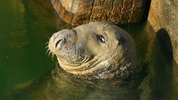Ecology - pelagic
Prof. Graham Pierce's group works on the biology and ecology of a range of marine animals, particularly cephalopods, cetaceans and fish, including studies on life history, parasites, habitat requirements, environmental relationships and trophic interactions, using data and samples from a variety of sources, including a long-standing collaboration with the Scottish Marine Animal Stranding Scheme.
A second focus is fisheries, including the assessment of target species, quantifying effects on non-target species, and the management measures and governance systems needed to achieve sustainable resource use.
Over the last 15 years we have also become increasing involved with statistical modelling and collaborate with Dr Alain Zuur and Dr Elena Ieno of Highland Statistics Ltd. In addition to laboratory work and data analysis carried out at Oceanlab, we carry out analyses of a range of ecological (e.g. stable isotopes, fatty acids, metals and persistent organic pollutants) and genetic markers in collaboration with other groups within the university and elsewhere, notably Marine Science Scotland and University of La Rochelle.
Our work on cephalopods started in 1990, through involvement with the first of a series of EU-funded projects on biology and fisheries of squid and other cephalopods, the origin of long-standing collaborations with research institutes and universities in Spain, Portugal, Greece, Italy, Ireland and elsewhere.
More recently we have been working on habitat modelling for cephalopods and developing candidate indicators of the status of cephalopods to meet requirements of the Marine Strategy Framework Directive. Our work on marine mammals originated in the mid-1980s, when we started work on seal diets; more recently, attention has turned to interactions between seals and humans in the Ythan estuary, on Oceanlab's doorstep.
Since the early 1990s we have increasingly focused on the life history and ecology of cetaceans, including work on diet, age and growth, maturation, contaminant bioaccumulation, ecological tracers, population identification, interactions with fisheries and habitat use. Building on EU projects such as BIOCET (2001-04) this work increasingly involves national and international collaborations, with research institutes, universities and NGOs in the UK, France, Spain, Ireland, Belgium, and the Netherlands, as well as PhD projects based in Italy, Libya and West Africa.
We have also worked on a range of fish species and fisheries, both demersal and pelagic, in the North Sea, Iberian Peninsula and Mediterranean. Increasingly, we are looking management measures and governance systems for fisheries, in particular implementation issues, and collaborating with social scientists and economists. The group also hosts the oil industry-funded North Sea Bird Club.
